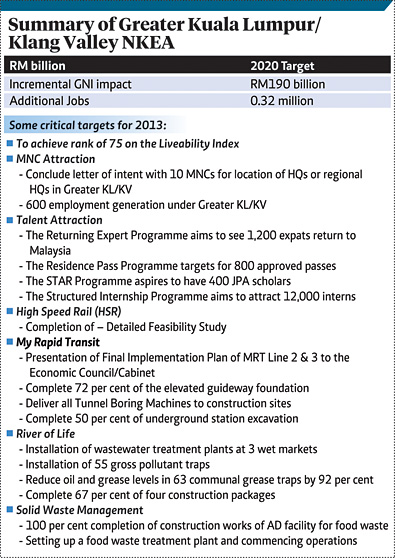KL aims for higher liveable city rank

Business Times, March 20, 2013
AMONG THE TARGETS THIS YEAR: Plan to push Greater KL/Klang Valley to No. 75 in Global Liveability Survey.
THE Greater Kuala Lumpur/Klang Valley (KL/KV) National Key Economic Area (NKEA) has several critical targets to achieve this year.
For one, it aims to push Greater KL/KV to No. 75 on the liveability index.
In the 2012 Global Liveability Survey, the Economist labelled Kuala Lumpur as the world's 77th most liveable city, up one rank from 2011.
Another target is the setting up of headquarters or regional headquarters for 10 multinational companies in Greater KL/KV, which will create 600 jobs.
Under the Returning Expert Programme, the government targets to see 1,200 expatriates returning to Malaysia this year and aims to approve 800 passes under the Residence Pass Programme.
Another critical target to be achieved for the Greater KL/KV NKEA is the completion of the feasibility study for the proposed high-speed rail connection to Singapore by the end of June.
A final decision is expected by the end of this year after taking into account results from the study, which will include negotiations with the Singapore goverment.
On the MY Rapid Transit (MRT) project, it will focus on the final implementation plan for MRT Lines 2 and 3.
The elevated guideway foundation is expected to be 72 per cent complete by the end of this year, and excavation works on the seven underground stations should be 50 per cent complete by then.
The MRT construction is on track, with Phase One due for completion by December 2016 and Phase Two the following year.
On the revitalisation of the Klang River, the project will see a number of developments this year. This includes the Precinct 7 construction expected to be tendered out by the end of the first quarter of 2013 and 14 construction packages under the Entry Point Project (EPP) to be completed this year.
In the greening of Kuala Lumpur, City Hall is expected to plant 30,000 trees and it will continue to look for private participation to do so.
The EPP is targeting the sponsorship of 5,000 trees by the private sector this year.
Other critical targets for this year include the improvement of 12km of pedestrian walkways and the setting up of a food waste treatment plant.
Back